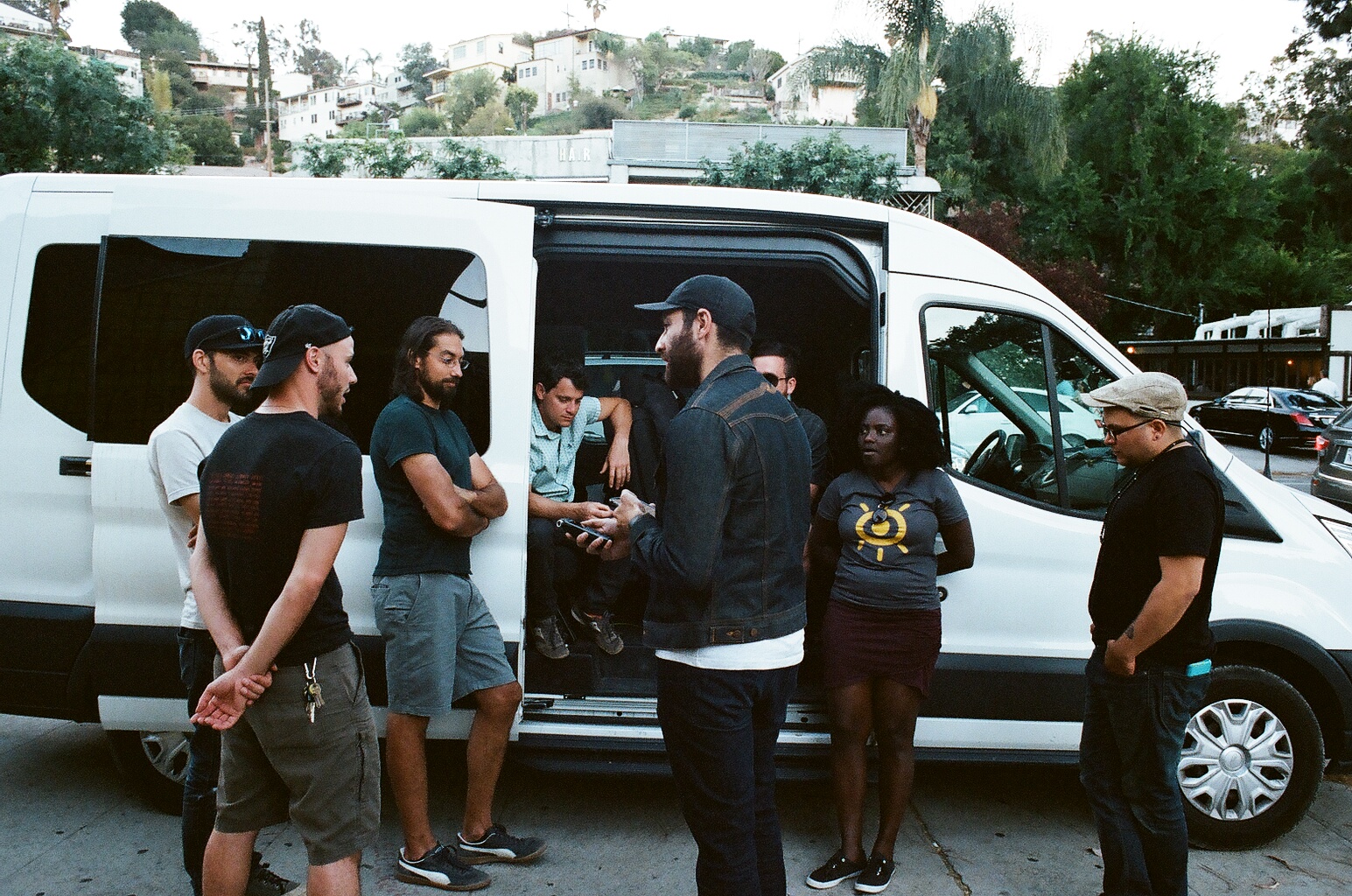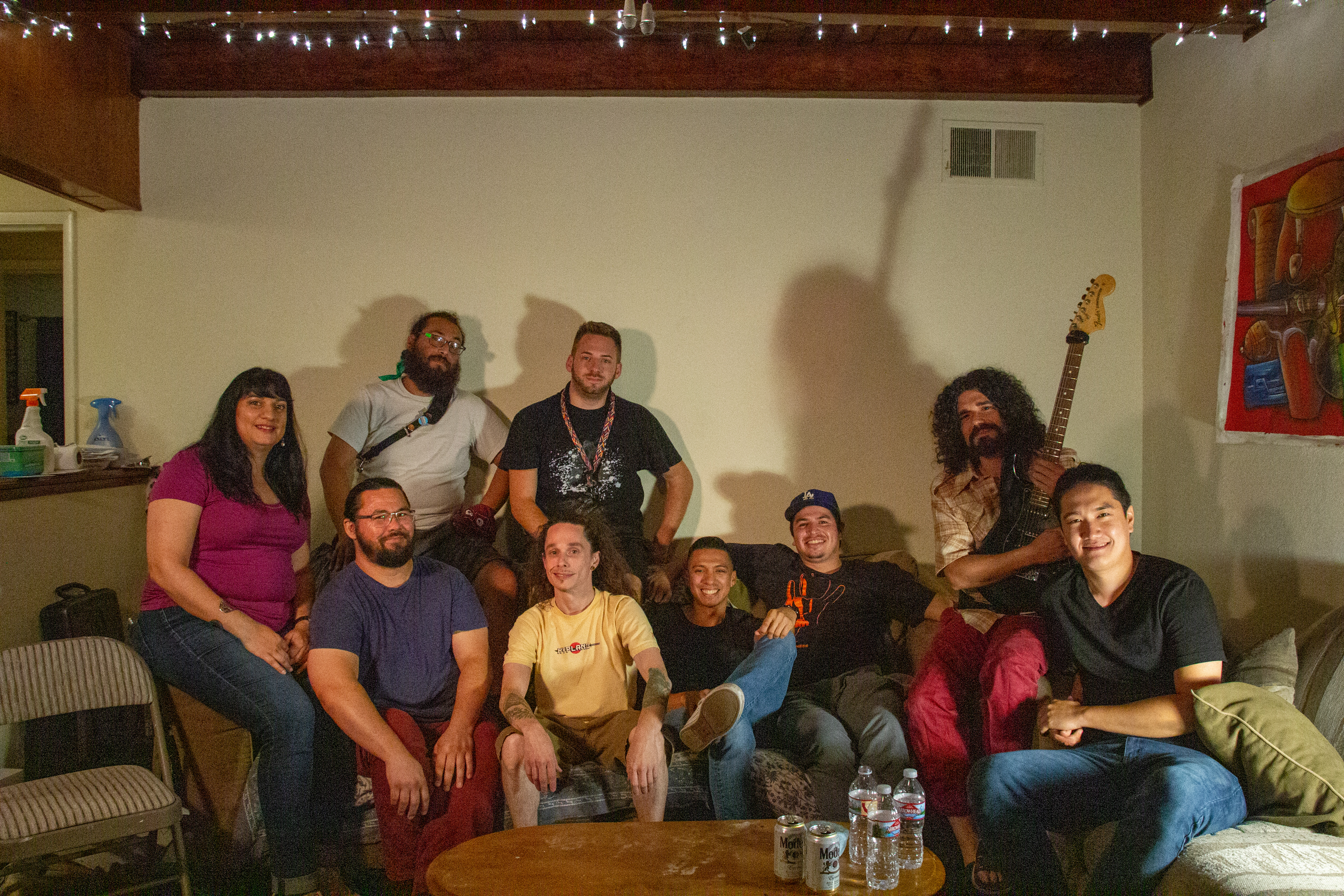Funny Things Will Happen with The Big Takeover
The Big Takeover is a reggae, ska, Jamaican rock steady influenced band from the Hudson Valley of New York. This band has been creating music and playing shows for over 10 years now. We met up with them just before their set July 5 at the Satellite in Silver Lake, the second stop of their "Funny Things Will Happen" tour. We spent some time hanging out by their tour bus learning about their history as a band, the nuances of their creative process, and the struggles they've had defining their musical identity.
The Big Takeover is composed of Chas Montrose on saxophone, Guthrie Lord on guitar, Roger LaRochelle on drums, Rob Kissner on bass, Manuel Quintana on percussion, Andrew Vogt on trombone, and NeeNee Rushie as lead vocalist.
You've played one show before tonight's at the Satellite. How has tour been treating you so far?
NeeNee Well we drove all the way to California from New York without playing any shows. We're going to do like a West Coast thing. We're doing shows in California, Colorado, Oregon, and Washington. We're also playing a show in Wyoming.
Chas We are literally going to fly to Omaha and play a show and then fly back and finish the tour. It should be fun.
NeeNee Funny things will happen!
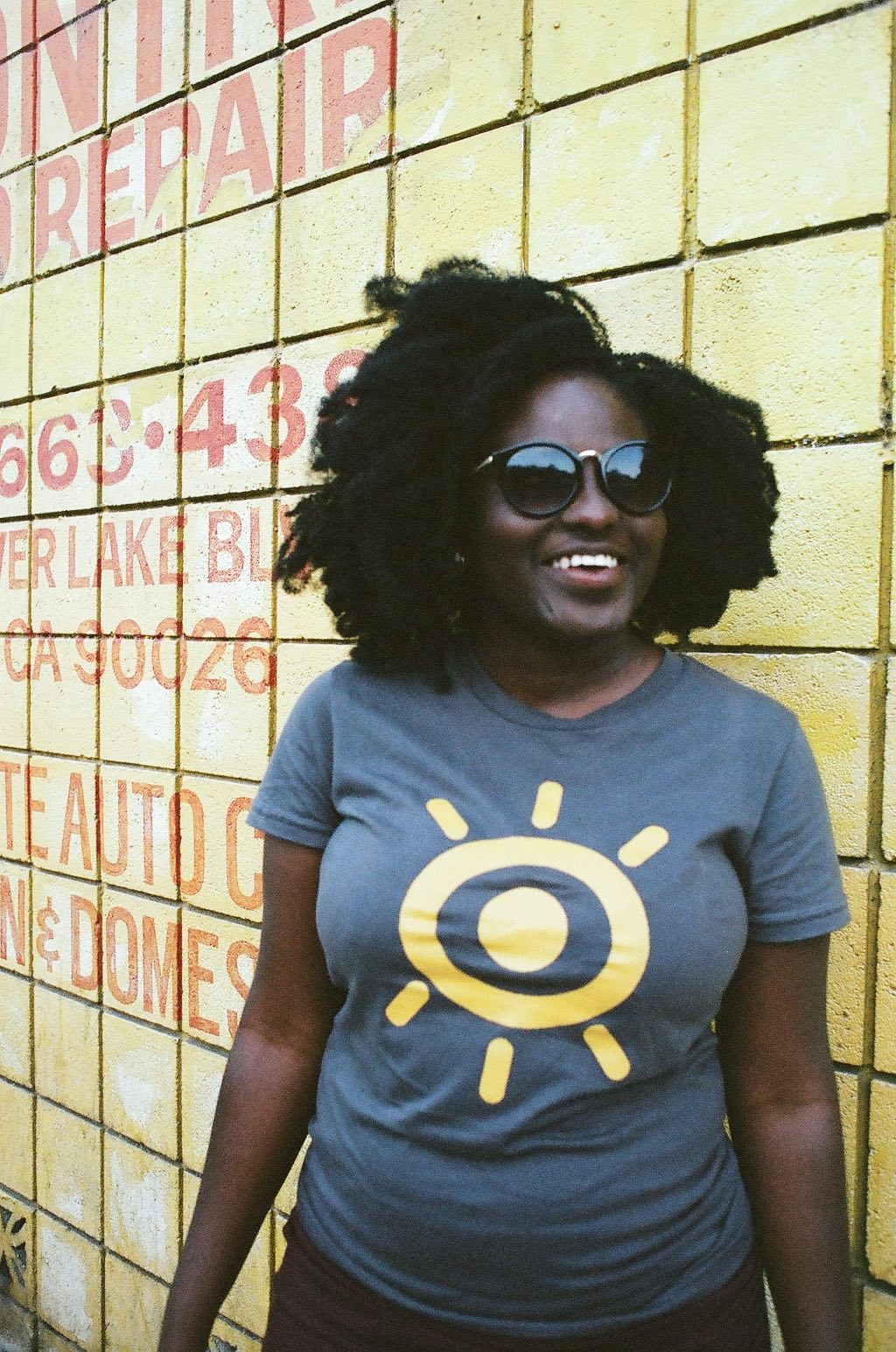
What inspired you to get together and create The Big Takeover?
NeeNee I met Rob and Sam, our original drummer, when I went to college in New Paltz. We became friendly and realized that we all liked a certain style of music and it just kind of worked out that we started the band, The Big Takeover. We started playing out and people liked it. Then it kind of snowballed and turned into this beautiful institution that we've had going now for over ten years. And, you know, people come, people go and it just keeps evolving and changing and growing and it's been a fun, fun journey. But it started in New Paltz.
How long has this iteration of the band been together?
Chas This exact iteration, not very long. Some of us have been there from the beginning; some have been playing with us for a couple of years. I'm glad we are traveling with this group though because we don't always have percussion with us and we don't always have certain instrumentation, but we've brought everybody with us for this tour.
Rob All we're missing now is the orchestra.

How would you describe the character of the band? What makes The Big Takeover unique?
NeeNee Well, we started this thing because we wanted to tribute music that came out of Jamaica. All the different kinds of music from reggae to ska to rock steady to everything in between. The band is special because of the fact that it's been going on for such a long time. Which means that it inspires the people that work within it. There's a lot of passion that goes into what we're doing. We bring a message of happiness and positivity towards people when we play out. People feel that energy and then there's like a mirroring effect, it keeps building.
Chas Dedication and sacrifice I would say too because we started from doing everything ourselves. When we're not playing shows, we have to do all the things to make money and everything like that. The double life is tough to keep going this long so it's a lot of dedication and a lot of sacrifice.
NeeNee There's like a special quirk to our music. People always ask us to describe the music and it's really difficult because we're trying to tribute a style of music but it's not really specifically reggae - it's just us trying to do what we do and people like it, so there's a certain quirk to what we're doing. It comes from the people that are in the band making the music, writing the music, and our little antics mixed into it.
Like a slow simmering sauce with a heavy pull to get people to move their bodies. Whatever it is, I think moving your body and having a good time seems to be a constant throughout our music.
Andrew We definitely got lucky in that every one of our past and current members has come from a different musical background. It's not like the typical kind of band where everyone follows exactly the same style and decides to go and make that specific kind of music together.
With our horn section we're definitely more ska kids at the end of the day, but we've got West African influences, blues influences, and Latin influences so it's not just first wave ska reggae. It's that plus whatever else we've kind of fed into it over the years. You can even track that evolution through our records. It's not just us getting better. On top of that, there's a kind of movement through different styles - a collection of things we pick up on the way and bring to the next stage of our development.
Manuel Like a slow simmering sauce with a heavy pull to get people to move their bodies. If there's anything consistent throughout probably all the albums, there's a heavy dance feel. People come out and hit the floor dancing, whether you're rocking out to a ska tune or something that has a hint of Afro-pop. Whatever it is, I think moving your body and having a good time seems to be a constant throughout our music.

You've released four albums so far. How has your process of writing music changed since the first album?
NeeNee When we first started writing songs we were 10 years younger. So we didn't have the wisdom or the experience that we have now or even, I'm going to say, the hunger that we have now.
I can only speak for myself, when I was writing, I didn't know what the outcome was going to be. I didn't know the objective of what I was writing. I was just putting words together. As we grew older, we started developing objectives. So when we started playing in front of people we saw that people really loved to dance or they liked to feel good. They were looking for a reason to dance or looking for a reason to feel positive about life. So that became a part of our theme. We started writing stuff that was going to make people feel good, we got a serious objective.
People always come over and they're like "oh what album should I buy" and I always recommend the most recent one. Not because that's the one that we're touring on or plugging but it's because I feel the most proud of that one because I was older and smarter when I did it.
Then as we developed as human beings and grew and became wiser, dumber, whatever, when you're growing and you learn lessons, you go through experiences so then that starts going into the music. You're writing about shit that you go through. You listen to more music, then you're inspired. So I think our writing is actually getting better. People always come over and they're like "oh what album should I buy" and I always recommend the most recent one. Not because that's the one that we're touring on or plugging but it's because I feel the most proud of that one because I was older and smarter when I did it.
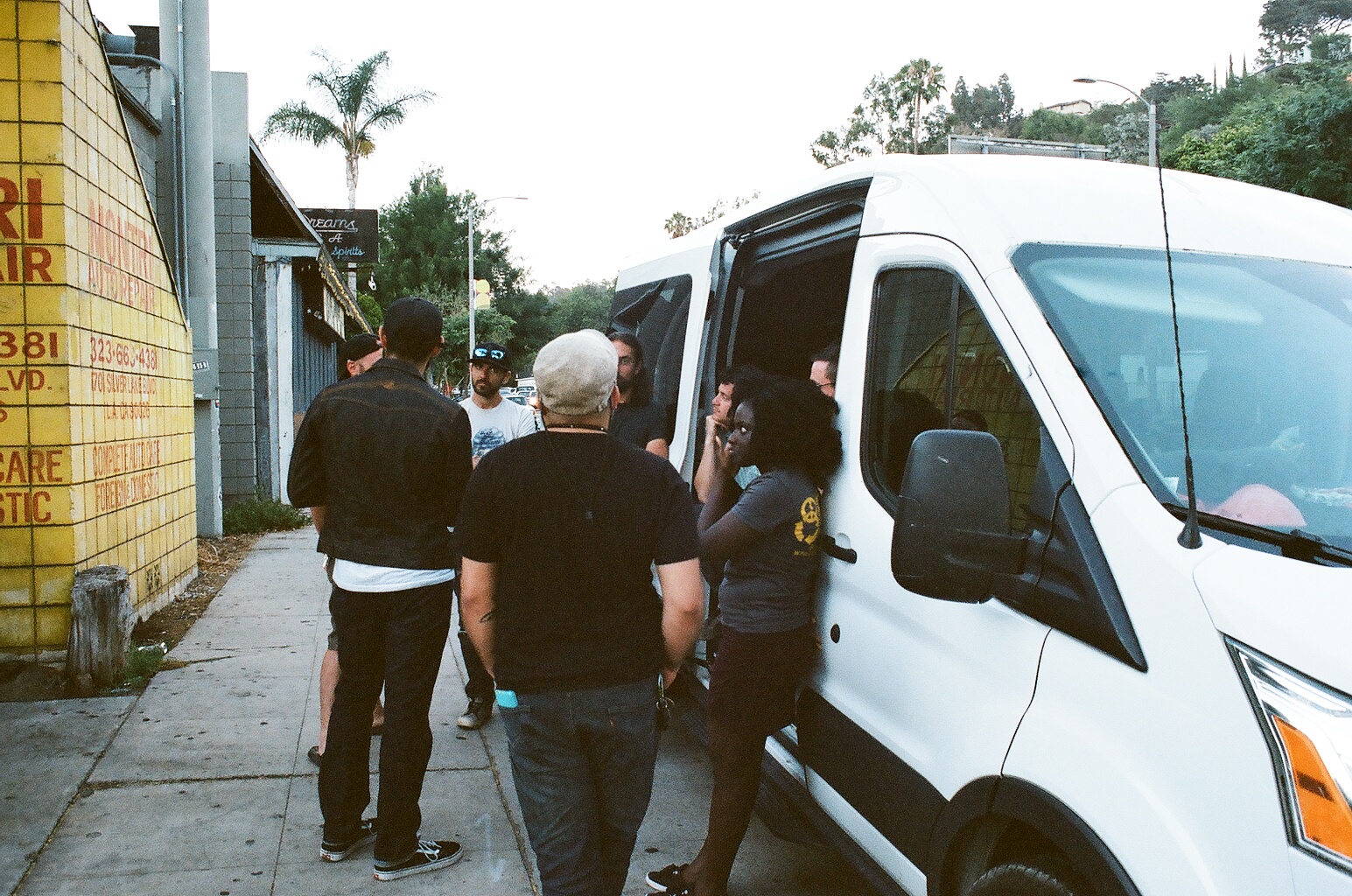
Do you ever feel that some of the songs that you develop don't fit the style that best represents the band and adjust those songs as a result? Or do you always allow songs to evolve naturally?
Chas Sometimes songs do take their own route.
Rob We had this one song called "Love Understands", and we probably named it something else for a while. We would work on it from time to time but it never really worked so we put it on the back burner. Then eventually, we came out with what it is now.
NeeNee "Dolphins" too was like a whole other song. And "Holiday" so yeah that happens all the time.
Andrew But then we still have "Small While". Which started out sounding a little rockabilly. We thought about changing the style but then thought, "no, let's just swing this out and work with it as it is." So now we got a psuedo rockabilly kinda song in the set which is weird, but it works.
Chas Yeah we don't fight it. We used to fight it but now we'll put it aside for a while. Kind of like our song "Funny Things Will Happen". Something wasn't right with it. We changed the key which kind of put us back a little bit on it and we said let's put it aside for a bit, it's not ready. That happens. We don't fight it anymore.
NeeNee We can be a little crazy. For example, "Funny Things Will Happen" - we're like "oh we should play it / we should play it / we should record it / what are we doing?" And then like "Love Understands" - we kept picking at it and then letting it sit in the background and then picking at it again.
But then other songs just happen and we're like "this sounds absolutely like NOTHING that we've ever done before but I LOVE IT. It's like the best thing we've ever done."
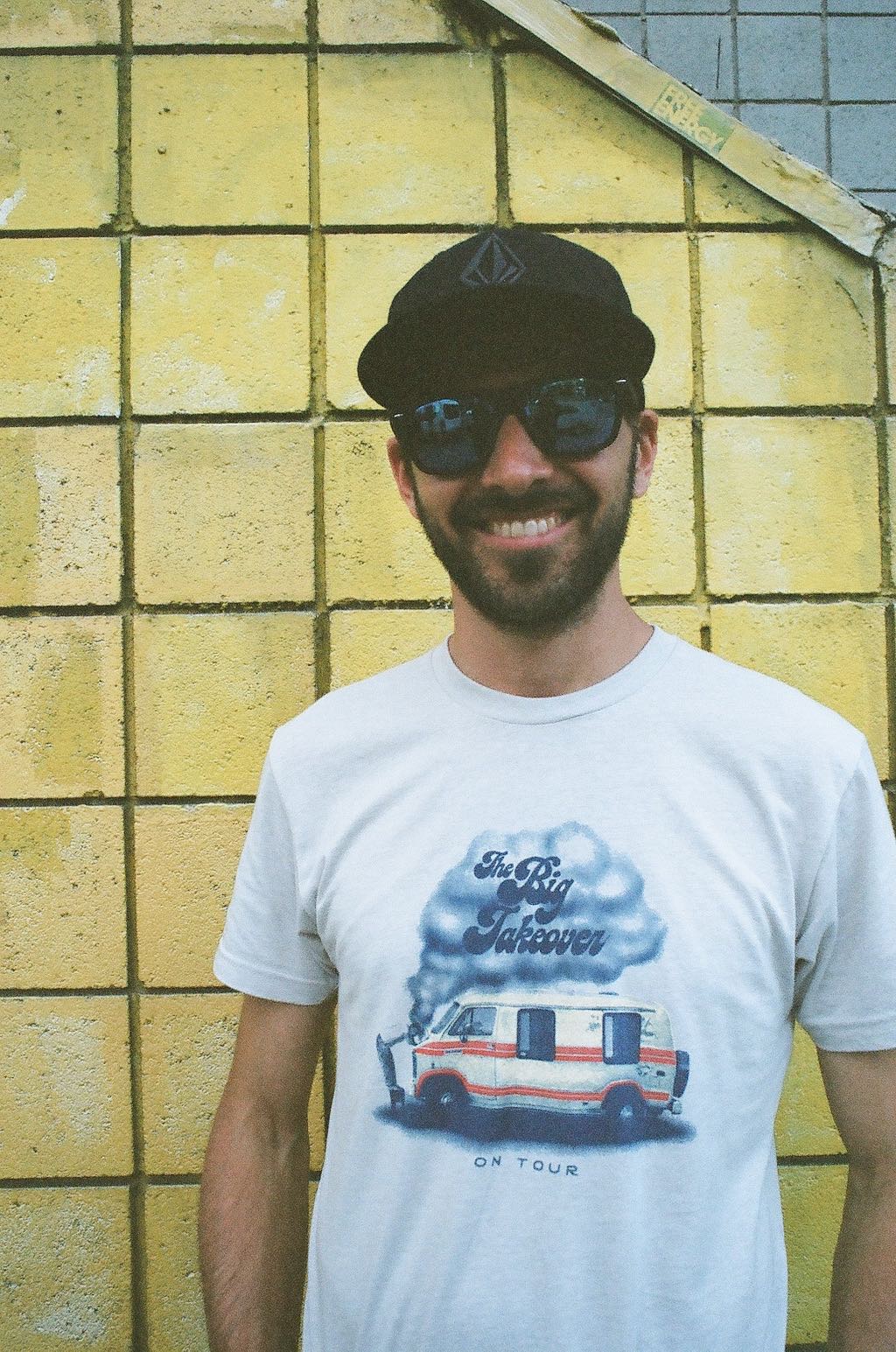
So you are mixing and recording all of your own songs. How did you decide to go that route rather than find a producer to do it for you?
Rob Whenever we would have somebody else mix our songs, I'd be like "that's not what we wanted." So what's the point? I'd rather spend a thousand dollars on audio engineering equipment to try to get the music sounding better than to sit in a studio spending that money because, you know, they won't mix it in the direction that it's supposed to be mixed.
With your own music, you know what direction you kind of want to go. To try to explain that to other people is difficult. I mean, I don't what the hell I'm even doing to tell the truth. But you have an idea of the direction that you want to move towards to try to find that sound. And it's easier to try to find it yourself, even though it keeps you up at night, it makes you angry and go nuts. Still, it's easier than trying to help somebody else understand what you want.
Manuel The nuances, the nuts and bolts, can get easily get lost in translation and you end up with something that might not be exactly what you want, and you may even settle because you've gone through this whole process and you've spent the money. You can kick yourself in the ass every day after that being like "ah, was that the right decision?" So things being lost in translation is probably the reason I think Rob has mixed the albums.
NeeNee From the beginning we've done everything on a home grown level. So that really worked for us. We just kept going with it and now we're lucky and we've found sooo many people that want to be a part of the movement and the ball is moving really nicely now. But there is a very big percentage of stuff that's still very home grown.
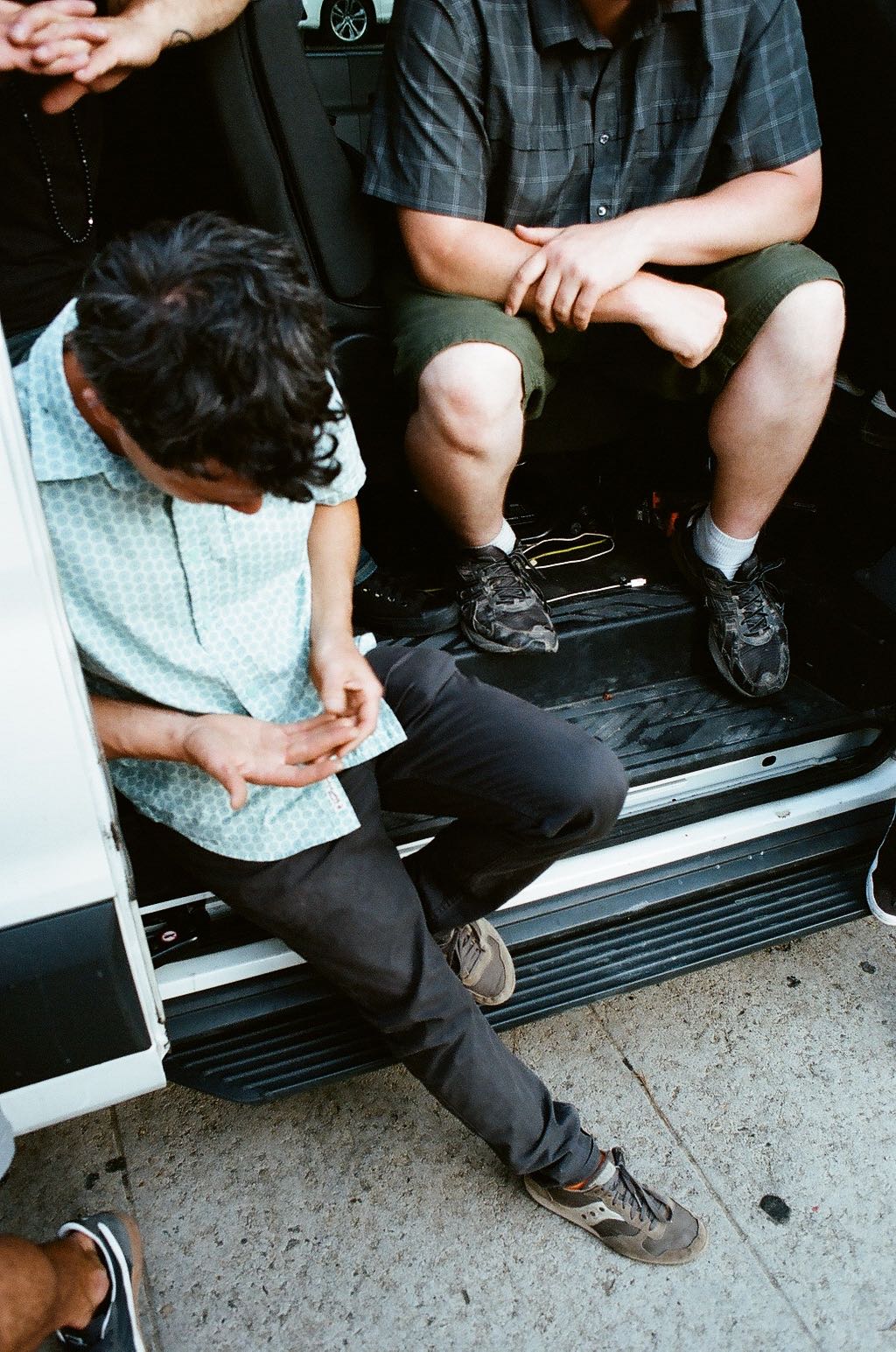
How have your experiences touring as a band impacted your approach towards making music and your perspectives on being in a band?
Andrew I'd say it's that when you're on the road there are certain things you can control and there are certain things you can't control and it's learning that line between accepting and trying to change things, that you learn when you're on the road. So to take that into the music making process: there are some things that you know you can try to craft into something and some things that don't sound right at the moment but leave it alone for a minute, let it marinate and maybe that'll come up a little better. And then it's turns out to be an even better thing than you thought it could be. Just letting it take its own direction and then catching it at a later point and seeing what is it at that point. That's kind of the touring experience.
Manuel Touring is a tremendous amount of work. It's non-stop. I mean, there's really nothing glamorous about it. Forty minutes or sometimes 60 to 70 minutes of the glamorous moment when we're on stage. And maybe when we get a nap. Other than that its pretty hard work and everybody here has a heavy load, everybody's lifting. Aside from our instruments and our playing, some are running the books, some are running the daily schedule, lining up interviews, putting our next address into the GPS. So it's nonstop.
Does the moment when you're playing the show seem to refresh you at every stop?
Andrew When you're drivin' and you're movin' and you're going from one place to another and you don't know where your hotel is going to be and you don't know the parking situation, there's so much going on but the moment you step on stage and you play that first note you are instantly in your comfort zone. That's something that you have done hundreds of times before and you will do hundreds of times again. That exact moment, you know exactly what you're doing for that 45 minutes to an hour and a half and then it's over and it's right back into it. In that brief moment, you get a little bit of rest and that's a good thing. It's mindless and comfortable and you can sit and breathe for a couple of hours.

How would you describe the reggae and ska scene in New York?
NeeNee There's not a lot of bands doing rock steady and ska and there are barely any female fronted rock steady and ska bands. There is a scene for reggae and there is a scene for third wave ska. But rock steady and authentic Jamaican stuff like what we're doing is kind of rare where we're from so I was so excited to see something like this happening over here in L.A. I don't know what the rest of the scene is like but this is a pretty good start. That shows me that there is a difference: the fact that there are two other bands joining us that are kind of doing the same thing that we're doing, that's pretty interesting.
Somebody thinks they're hiring a reggae band and it's not always what we're playing.
Do you feel that the fact that there aren't many bands in New York doing what you're doing helps to differentiate you?
NeeNee Yes and no because it makes us unique and some people flock towards things that are unique. But some people want the same old thing. And I mean, I'm not trying to offend anyone or any group of people but sometimes it's challenging and it's an uphill climb because we're so different and sometimes people hear something that's different and they're like "whoa whoa whoa". You know, "I'm not used to hearing the offbeat or I'm not used to NOT hearing Bob Marley." So yes and no.
Chas That's what makes us a little hard to market too because we kind of put the reggae label as our main genre but boy it's hard to really pinpoint our style because we're just meshed up with so much stuff. So yeah, somebody thinks they're hiring a reggae band and it's not always what we're playing.
More vaguely, it's more like dance music and party music. We just want people to get up and have a good time. So that's obviously extremely vague when you want to tell somebody what kind of music you play, but that's kind of the goal right? And that's kind of where we're at. We play showcase places sometimes where it's dinner and a show and it's great because you can tell that people are enjoying the music and that's what they're there for. Its still a little uncomfortable to not have people standing and moving and dancing because that's mainly what we're about, but those gigs are good too because you get people who are there to just listen to good music.
Are there bands that you play with consistently? Do you have a group of bands that you put together shows with?
Andrew Well it kind of comes and goes. Maybe the occasional one for a show or two. We go to them they go to us.
Rob The more that we play out now and the quote unquote larger we get in our own home area, it's harder to have control over setting up show swaps with other bands because we're often on the road. And when we're at home, we almost need that time to bring our piggy bank back to somewhat sustainability. So we haven't really had chances to do show swaps anymore.
Chas We're all over the place too. Most of the time we're weekend warriors so one weekend we're going to Vermont and the next weekend we're going to Pennsylvania. It's two completely different directions. Other bands that we might meet when we're on the road are also on the road. So I mean we're not gonna piggy back with them too much because they're on a different path.
We've graduated out of the dive bars near us. Now we're playing the venues where we know people are going to see some music.
Does the same go for venues? Are you playing a variety of different venues or do you have a regular spot?
NeeNee Well back home, we have a few places that we enjoy playing and we always go back to those rooms because we like how it feels when we play there. But when we're on the road, I don't think we're at a level yet where we could be like "we want to play here" and book those venues easily. We're working on that.
Chas We've graduated out of the dive bars near us. Now we're playing the venues where we know people are going to see some music.
Andrew We're starting to get that East Coast though. Nasheville and West Virginia. We have a handful of venues we go to because we've done that route a couple of times before. So we can call those venues and say "hey, we're going to be here within this time frame, can we setup a show?"
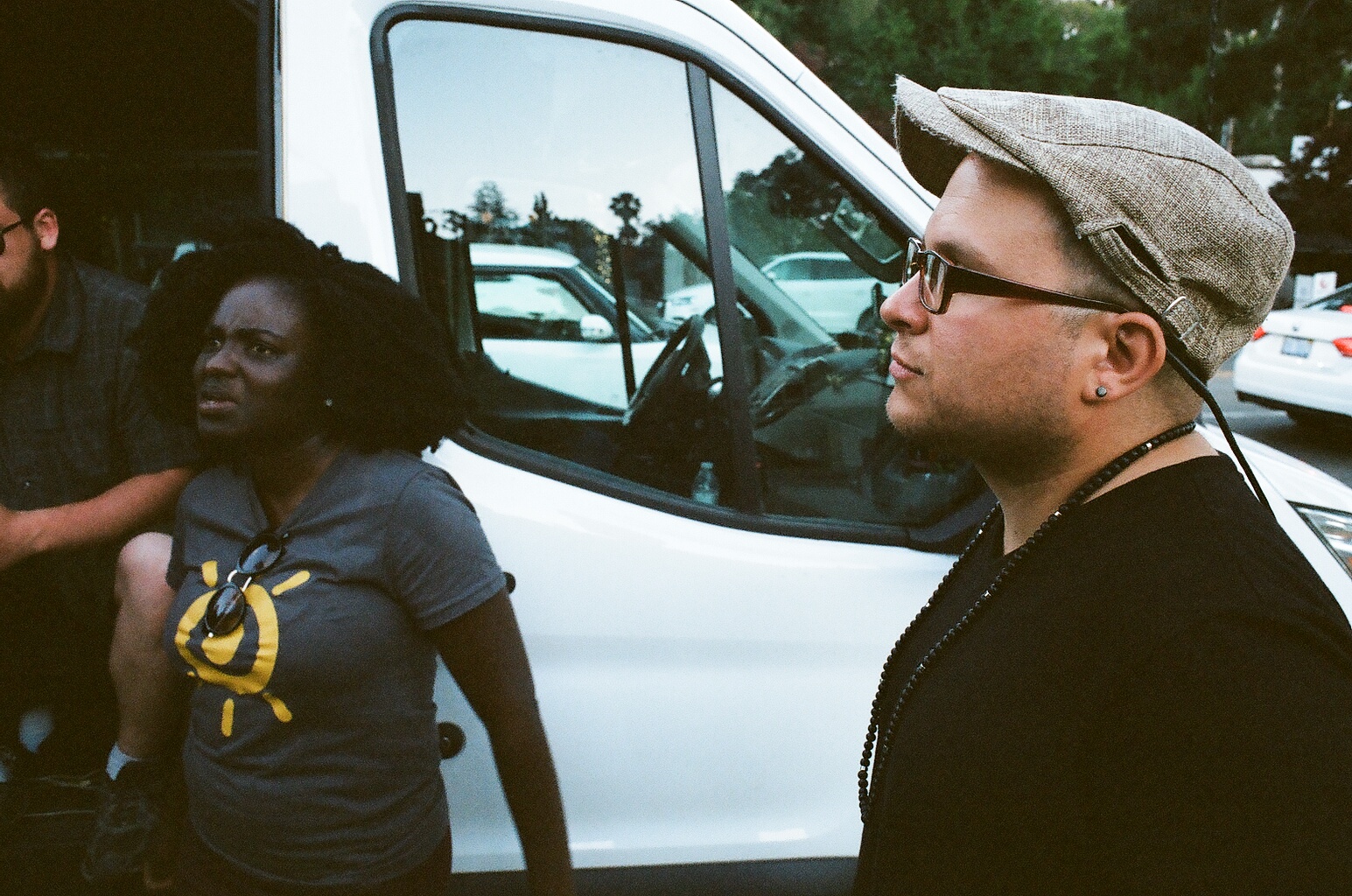
What bands are you listening to now that inspire and influence you?
Chas There's kind of a difference between what bands we listen to and what inspired us to do what we're doing now - because I grew up listening to classic rock 'cus that's what my dad listened to, so rock 'n roll is really kind of where I came from but I play saxophone and I've always played in ska bands and reggae bands.
Maybe a band like the Police might have given me that little taste of reggae. Andy and I grew up together and we've been playing horns together for a while. We used to play jazz back in the day too, like the big band stuff. Big band, I LOVE that stuff. I guess that influenced my saxophone playing but, like I said, as far as music I listen to: classic rock and oldies. Subconsciously, they probably do inspire me a little bit.
Andrew For me, I've always been interested in the universal nature of ska. Mexico City for a while had a great ska scene. There was a band called "Los de Abajo" that I was into for a number of years listening to that kind of Mariachi driven horn line and there's a couple of Russian ska bands - Russkaja is one I listen too. Taking those different cultures and plugging them into a system that I already understand is definitely conducive to kind of stretching out a little and influencing those horn lines.
Manuel I grew up in Puerto Rico mostly, and there was a big Latino ska scene in Argentina, Brazil and all those countries and that definitely snuck into my upbringing. So that's my take. My biggest influence at least in the ska world came from that angle of ska. We have all these other angles. Like Chas said, even the Police has just like a hint of ska sunk into like mainstream rock. I had this whole other Latin ska thing that was happening and that's been happening forever.
At what point in your band's history, over the past ten years, did you decide that you wanted a manager? What role does a manager play in your band?
Andrew We realized that about six years too late.
Rob Some bands, especially in the indie world, are able to do it themselves which is great and we could do it ourselves. But some people just aren't good at doing it.
Chas It was the kind of stuff that we didn't want to do anymore and that we weren't really able to handle on our own. And we knew somebody that could. Luckily, he was totally into it and he's been doing a great job. That's really what it stems from. Maybe it was a too late in our part to bring on a manager, but we're a lot better off now that the wheels are a little more greased and thing are going a little more smoothly.
Rob You gotta know somebody who's kind of a whack job, who talks too much you know, who is persistent and will just agonize you. So we found the person.
I feel like getting management that was outside of our band members saved us because I was in it deep, deep and I was starting to not enjoy what I was doing anymore.
NeeNee Choosing to get management was a really excellent decision because it was at the point where we were doing it all ourselves and we were burning out. And I feel like getting management that was outside of our band members saved us because I was in it deep, deep and I was starting to not enjoy what I was doing anymore. Like Rob said before, some people just aren't good at it and I'm happy to say I suck at managing stuff like that. You know, I wanted to sing and create songs and now I can focus on that.
It takes a psychopath to really make you bloom.
Rob You need to have a go getter, all the time constantly looking for things. And for a while, NeeNee and I were just playing defense really. When the emails would come in for shows we would say "OK cool, we'll take the show." That was it. And we were still getting shows, we were still getting e-mails, but we weren't blooming. And so it takes a psychopath to really make you bloom. Thank you Alex! Aquarias Entertainment.
Chas You don't want to mix the artistic form with the business objectives because right down to the bone what we're doing is a business and the only way you're going to stay afloat is if you fight in the business and you have people fightin' for you. The more that takes up our time, the less we can concentrate on what's important to us. Yeah, it was an extremely big decision to make. So I'm glad we did it.

What are your perspectives on Spotify, Apple Music, YouTube and other online music platforms? Do they help you or hurt you?
Andrew I can't really speak too much for ourselves on this one aspect, but a friend of ours had one of her songs put on the initial download list for a lot of the Apple products. So you buy an iPhone and that's one of the stock songs that's put onto it and that song has god damn EXPLODED for her and it's really putting her out on that front page. So I think having something like that, something that's widespread enough, even for one song, is enough to really get you out in front of a whole bunch of people. And you know, even if we're not getting that, we're still on things like Spotify. Even having one more place you can direct someone to so that they can hear your music is helpful. Give them 16 options and they might pick one sixteenth of those but they'll still be able to hear it.
Rob Music in general now, via the digital age, has become more like a billboard. You're not making money from selling music, but you've got to have recordings up as much as possible up with as much exposure as you can get.
That made us not getting fed that night, not getting paid and having a horrible, horrible time and getting dripped on by a leaking roof, it made it worth it because this girl who's here loved us. She found us on Spotify.
But we were in Texas playing probably one of the worst shows we've played in a couple of years. No one was there. It was a terrible, horrible show. The venue was practically falling apart. Some girl showed up who was from the city where we were playing. We had no idea who she was, but she showed up and she knew all our songs. That made us not getting fed that night, not getting paid and having a horrible, horrible time and getting dripped on by a leaking roof, it made it worth it because this girl who's here loved us. She found us on Spotify.
NeeNee People always ask, "oh, what do you think about Spotify because you get very tiny percentage of whatever." And I'm like I don't care, people are listening. I wish we had to guard the merch table. Just the fact that people are on there provides an option that's open for people to hear our music. That's what I want. I just want people to hear it. It's amazing to just have the music there for people to listen to.
Chas That being said, because of social media and everything else, you have to have a good game with that now these days too because on the business side of things, that's humongous. I mean our social media game isn't the strongest for being a band for 10 years so it is something we struggle with. but it's important and it's something you always have to be thinking about. Of course our management has helped with that too.
Rob We'll try to book a date at a place and the club will look at our Facebook likes and we're like "c'mon man". But it makes sense; that's how they look at it now. It makes sense in some weird world we live in but still it's like "really? Give us a break".
NeeNee Unless a lot of people are, A LOT OF PEOPLE, are listening, you're not going to really make a lot of money with those music platforms.
Andrew It's a universal truth. Anything like that, YouTube or Spotify, or anything where you're making a product and then putting it out and hoping that enough people see it before you get paid. There's always going to be a handful of people that have done really, really well and can make millions of dollars a month doing this kind of thing. So there's that top tier. And then everyone else kind of falls below that.
Do you aspire to live off of the work that you're doing in the band?
Rob I would be completely fine, I might speak for most of us, to still have a side hustle when I came home from tour. Completely fine. If I could go on the road and make a decent living and eat twice a day. When I came home, if I knew that at the end of the month or two months from now, that I would be on the road again doing what I love. If my day job side hustle was picking up turds I'd be fine because I knew that eventually I would be back in this crazy van with these crazy people.
If somebody were to have given you advice when you first got together, what do you wish that advice would have been?
Andrew Make friends, super early. The opportunity to interact and make connections with the different bands that you're playing with or that are in your genre or maybe someone who's a manager or booking agent or maybe someone who happens to own like a recording company, anything like that. The ability to make those connections as early as possible is important 'cus that stuff's going to branch out as you go so if you started really late it's going to blossom but if you started early you're going to get that full bush. Every connection that you can possibly make is significant. So make friends early on.
Rob Take a social media class.
Chas I would say in general, probably take bigger risks early on because we're now starting to take some risks like coming out here to L.A. that we probably should have done when we were younger. So it was more like, "well we'll see what happens, we'll keep this going, at least we're playing shows" and all that but now we're starting to take risks that are starting to pay off. We're starting to see that maybe if we pushed ourselves a little further when we had a little more stamina or when we were first getting going we might be a little further now but, you know, we've learned.
Rob Get the credit cards, swipe 'em as much as you can 'cus at the end of the day no one's gonna cut your legs off. And then you have more time to get your shit together later on. When you're 18 swipe it, fuck it, just go crazy. We shoulda beeen rolling around in this van years ago.
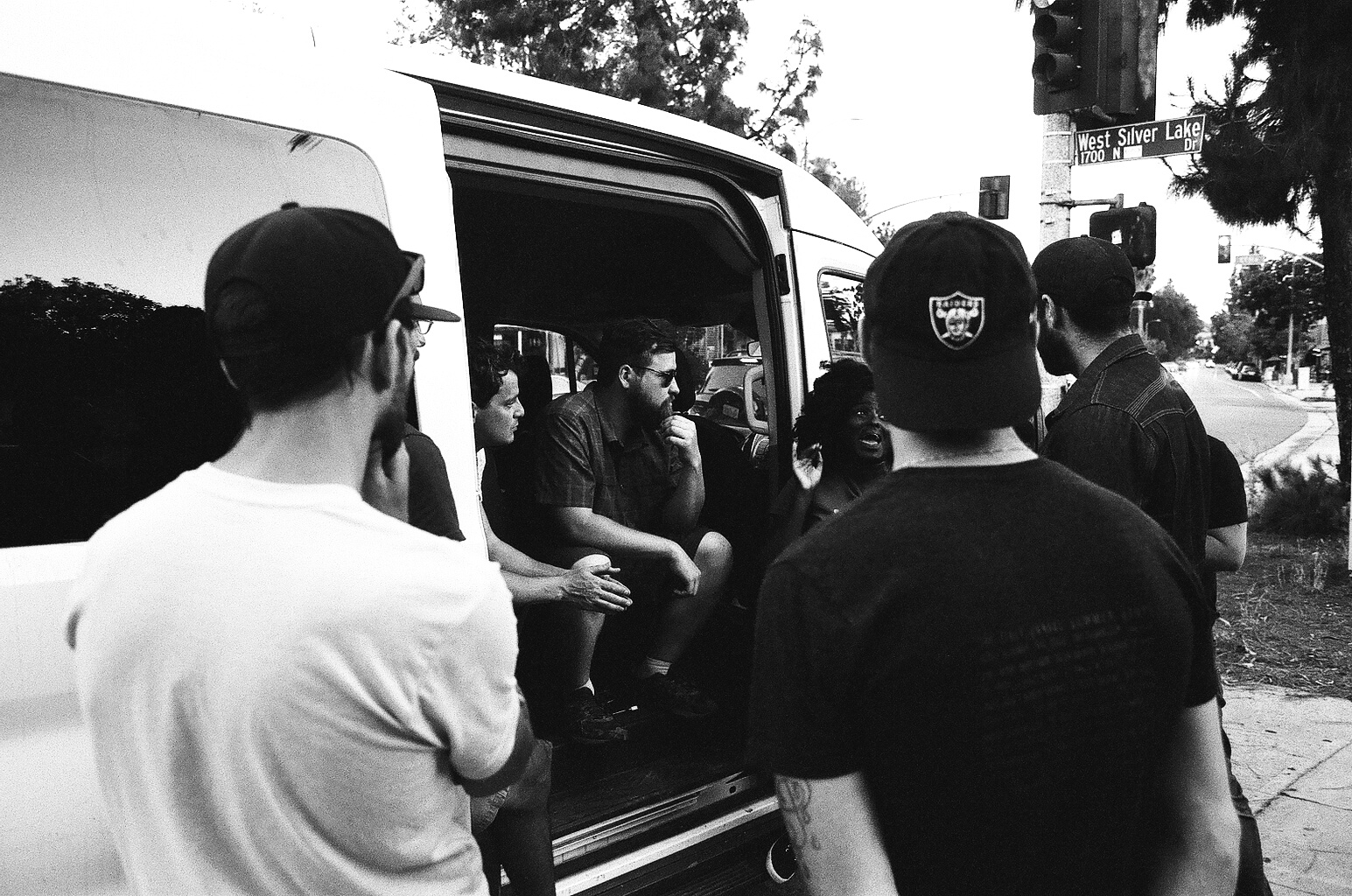
What's the next big step for The Big Takeover?
NeeNee Well we're working on our next record - we're writing it and trying to record it. So that's a big step. We're hoping to tour Europe in the near future. So that's another possibility.
Chas We finally got a decent booking agent. That was a big goal for a while. Our manager was kind of handling that too which he didn't sign on for and was actually doing a pretty good job with that being something else on his plate but now we have another pair of people fightin' for us and workin' for us which is good. That was a goal for a while.
It's hard. You know, we're limited to how often we can hit the road. With everything we each have going on in our lives. To find someone who was willing to work with us was big.
Rob Yeah, to fill in the gaps because we just went across the country. We played no shows for five days. That was crazy. You feel useless. You feel like you have no purpose in life. It only takes like 2 or 3 days to get that way. So you know, getting a booking agent who really just has connections all around the country and will put you in festivals is significant.
This is a beautiful time of year. Festivals all around the country. So hopefully that's the next big step: next year a serious festival circuit. And we'll see what happens. We'll cross our fingers and pray.
Manuel Short term: paying off the van is a goal. Finding sushi tonight is a good goal so we need a sushi recommendation. That's one goal to shoot for tonight.
Much thanks to The Big Takeover for spending the time to share their experiences, thoughts, and story with us. Two weeks after this interview, the band was in a car accident which wrecked much of their equipment. Thankfully no one was injured. The band was able to quickly recover the cost of expenses by posting a GoFundMe page. The speed that they were able to cover their costs demonstrates the strength of the community that they've built up around them and the impact that they've had through their music. We're looking forward to the next Big Takeover album and more upcoming shows.
